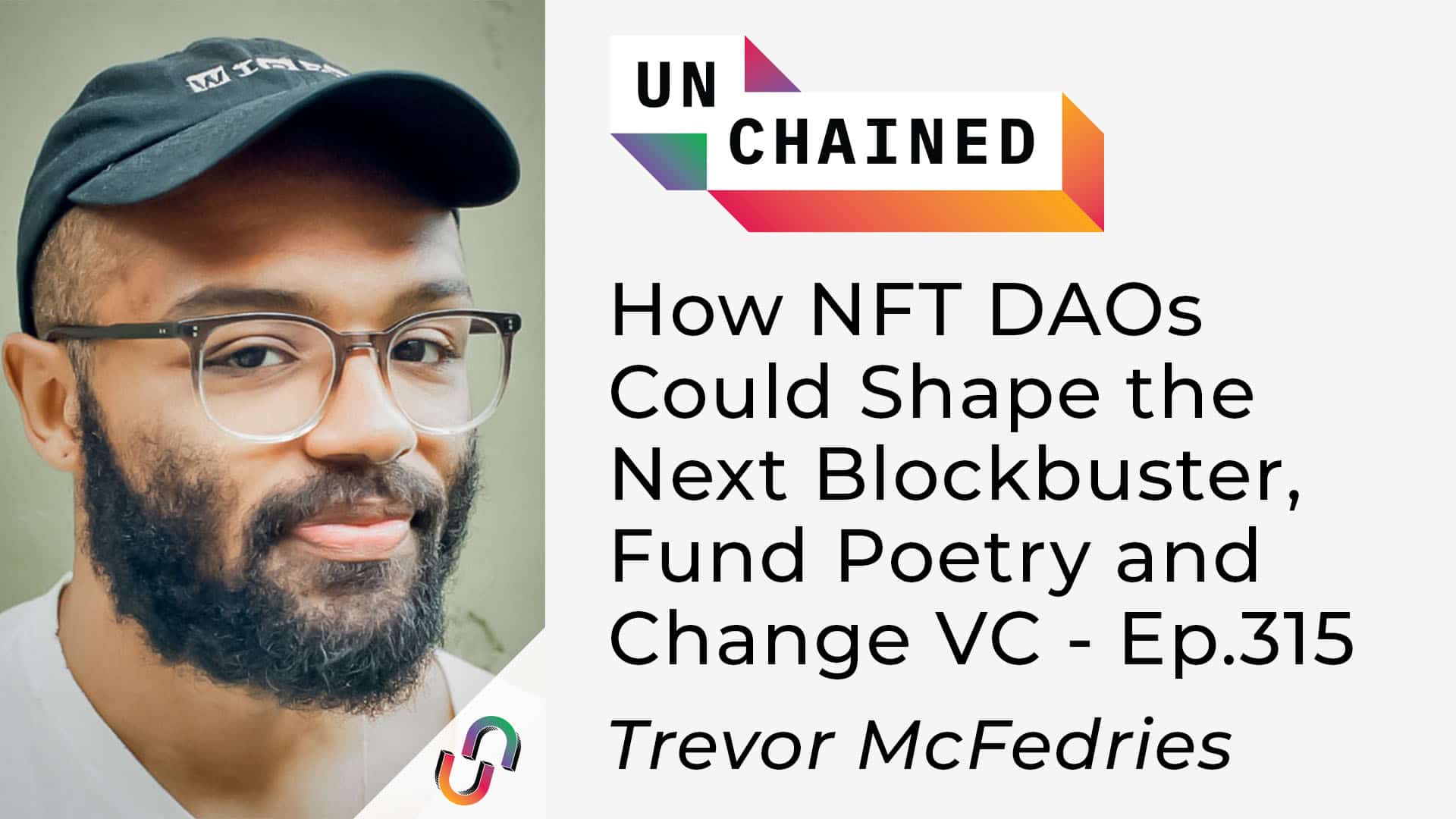Dapper Collectives CEO and Friends With Benefits founder Trevor McFedries joins Unchained to discuss social tokens, NFTs, the creator economy, $FWB, VC snacks, DAOs, Cooper Turley, and more. Show highlights:
- Trevor’s past, which includes a top 10 album, working at Spotify, founding Brud, creating Lil Miquela, and, of course, falling down the crypto rabbit hole
- what Trevor’s vision for Dapper Collectives is
- what type of activities DAOs will facilitate in the future
- why Trevor is so excited to be working with Dapper Labs and Flow
- what Friends With Benefits is and how the $FWB token works
- what sort of tokens make up the Friends With Benefits treasury
- why venture capitalists who want to be involved with Friends With Benefits need to have a good snack game
- why Trevor is not worried about $FWB becoming a security
- what plans Friends With Benefits has in store for 2022
- Trevor’s response to Friends With Benefits suspending co-founder Cooper Turley regarding 10-year old racist and homophobic tweets
- what can be done to onboard a more diverse demographic to crypto
- how Trevor defines the passion/creator economy
- what Trevor is looking forward to in 2022 regarding NFTs, DAOs, and social tokens
Join the Unchained With Laura Shin discussion group on Facebook!
Laura is launching a paid Facebook discussion group where you and other listeners of the show can discuss recent episodes, ask questions in advance, get access to special AMAs with myself and show guests and more. Those who join now and for the next two weeks will get a special introductory price of $2.99 a month or $29.99 annually. Those who join from February 15 and on will be charged the regular rate of $4.99 a month or $49.99 annually. We will open up the group on the 15th, one week ahead of my book launch. If you’re interested in subscribing, head to https://laurashin.bulletin.com/subscribe.
Check out my new author website!
Keep up to date on all things I’m up to at the newly launched laurashin.com. There, you can find out all the latest on my book, all my writing, and press and speaking appearances. Enjoy!
Thank you to our sponsors!
Crypto.com: https://crypto.onelink.me/J9Lg/unconfirmedcardearnfeb2021
Beefy Finance: https://beefy.finance
Bosonic: https://bosonic.digital/
Episode Links
Trevor Mcfedries
- Twitter: https://twitter.com/whatdotcd
- LinkedIn: https://www.linkedin.com/in/trevor-mcfedries-0a5285a8/
Work
- CEO – Dapper Collectives
- Founder → Brud
- Twitter: https://twitter.com/makebrud
- Website: https://www.brud.fyi/
- Lil Miquela: https://www.instagram.com/lilmiquela/
- Acquisition by Dapper Labs: https://techcrunch.com/2021/10/04/nft-startup-dapper-labs-acquires-virtual-influencer-startup-brud/
- AI Influencers: https://mailchimp.com/courier/article/ai-influencers/
Friends With Benefits
- Basics
- FWB website: https://www.fwb.help/
- Mirror: https://fwb.mirror.xyz/
- Twitter: https://twitter.com/fwbtweets
- FWB Etherscan: https://etherscan.io/token/0x35bd01fc9d6d5d81ca9e055db88dc49aa2c699a8
- CoinMarketCap: https://coinmarketcap.com/currencies/friends-with-benefits-pro/
- Background Reads
- Trevor’s role: https://consensys.net/blog/codefi/friends-with-benefits-a-new-model-for-social-tokens-on-ethereum/
- a16z investment: https://a16z.com/2021/10/27/investing-in-friends-with-benefits-a-dao/
- FWB deep dive: https://ra.co/features/3914
- Intelligencer write up: https://nymag.com/intelligencer/2021/10/whats-a-dao-why-your-group-chat-could-be-worth-millions.html
- Coindesk write up: https://www.coindesk.com/business/2021/11/09/the-social-token-network-rally-friends-with-benefits-and-the-future-of-branding/
- Cooper Turley removed from DAO
- https://twitter.com/mewn21/status/1482202603563798530
- WHALE treasury tokens
Additional Links
- Sound.xyz
- Catalog
- Daily Ape on DAOs: https://thedailyape.notion.site/DAOs-95332c7ab79c49dc89f9a72c628dfeb8
- Social Tokens:
- Linda Xie:
- Forefront: https://forefront.market/learn/social-tokens
Read the episode transcript here



